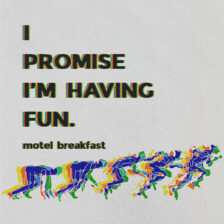Loveless
Read More “Loveless – “I Love it When it Rains” Video”Albums in Stores – Apr 19th, 2024
If you hit read more you can see all the releases we have in our calendar for the week. Hit the comments to access our forums and talk about what came out today, what albums you picked up, and to make mention of anything we may have missed.
Read More “Albums in Stores – Apr 19th, 2024”Underoath Announces Anniversary Tour
Underoath have announced a They’re Only Chasing Safety tour.
Read More “Underoath Announces Anniversary Tour”MEST – “When We Were Young” Video
Mest have shared a video for “When We Were Young.”
Read More “MEST – “When We Were Young” Video”Aaron Dessner Shares Message About TTPD
Aaron Dessner has shared a message about Taylor Swift’s latest:
Read More “Aaron Dessner Shares Message About TTPD”We started working on these songs over two years ago and it feels like they have kept us company and evolved in beautiful and unexpected ways through so much life lived during this process. It’s hard to believe Taylor and I have now recorded over 60 songs together (17 across this anthology!!) in the 4 years since we began working together on Folklore in 2020. I am forever grateful to Taylor for sharing her insane talents with and trusting me with her music. I believe these songs are some of the most lyrically acute, intricate, vulnerable and cathartic Taylor has ever written and I am continually astonished by her skills as a songwriter and performer.
John Mayer Talks Next Album Plans
John Mayer talked a little about his upcoming music plans. He’ll work on a new album after the current tour, has about half of it written, and doesn’t want to release too many new songs early because he thinks it dilutes the album experience.
Read More “John Mayer Talks Next Album Plans”A Statement From Former Strung Out Drummer
Jordan Burns, the former drummer of Strung Out, has released his own statement about his departure from the band. You can read that below.
Mitski – “Star” Video
Mitski has released a video for “Star.”
Read More “Mitski – “Star” Video”Florrie – “Kissing in the Cold” Video
Florrie has shared the new song “Kissing in the Cold.”
Read More “Florrie – “Kissing in the Cold” Video”Hot Chip’s Tiny Desk
Hot Chip performed for NPR’s Tiny Desk Concert series.
‘Deadpool & Wolverine’ Trailer
The trailer for Marvel’s Deadpool & Wolverine has debuted.
Read More “‘Deadpool & Wolverine’ Trailer”The Early November – “The Fool”
The Early November have released the new song “The Fool.”
Read More “The Early November – “The Fool””SeeYouSpaceCowboy – “Lubricant Like Kerosene” Video
SeeYouSpaceCowboy have released a video for their song “Lubricant Like Kerosene.”
Read More “SeeYouSpaceCowboy – “Lubricant Like Kerosene” Video”Record Store Day Countdown: Collective Soul – Dosage
The march towards Record Store Day continues today with a look at Collective Soul and their fourth studio album, Dosage. The record is celebrating a 25th anniversary this year, so the timing was perfect to reissue this LP. This “RSD First” release is limited to just 2,000 copies via Craft Recordings, and it is pressed on “translucent lemonade” vinyl. The set features the singles “Heavy,” and one of my all-time favorite ballads in “Run.”
Read More “Record Store Day Countdown: Collective Soul – Dosage”Review: Motel Breakfast – I Promise I’m Having Fun
The sophomore album from Chicago’s Motel Breakfast, called I Promise I’m Having Fun was produced by R. Andrew Humphrey (Twin Peaks) and captures an indie rock spirit in the same vein of bands like Cold War Kids, Dr. Dog and The Menzingers. These emo-tinged songs were written by all five band members, and showcase a band starting to come into their own identity. Motel Breakfast is Conor Brennan, Drue deVente, Jimmy Drenovsky, Mick O’Donnell, and Jesse Nasadowski, and their band chemistry pays off on I Promise I’m Having Fun.
Read More “Motel Breakfast – I Promise I’m Having Fun”













